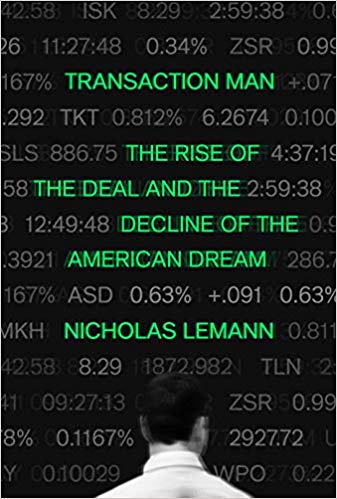You have /5 articles left.
Sign up for a free account or log in.
 Transaction Man: The Rise of the Deal and the Decline of the American Dream by Nicholas Lemann
Transaction Man: The Rise of the Deal and the Decline of the American Dream by Nicholas Lemann
Published in September of 2019.
Anyone who thinks about the future of higher education is likely to find themselves in a state of unease.
The trends are worrying.
A decade from now will witness unprecedented declines in the numbers of new high school graduates, particularly in the Northeast and the Midwest. These demographic headwinds, combined with continued public disinvestment and rising costs, have pushed many schools to various levels of financial instability. The decline of tenure-track positions, in favor of adjunct faculty, is one strategy that colleges and universities have pursued to bring their revenues and costs in line with one another.
Transaction Man tells a much larger story than that of higher education. What Lemann is after is to explore how the U.S. got from a middle-class country to a society mainly defined by income inequality and insecure gig employment.
In Lemann’s telling, the decline of economic security and political consensus - made most visible in the election of Trump in 2016 - is a result of long-term forces operating on the nation’s political and economic structures. Lemann traces shift in the economic and governing ideology from that of a society dominated by institutions, to one defined by transaction, and eventually networks.
In typical Lemann fashion, this big and long-running story of ideas is grounded in the lives of the people who both espoused and personified their origins and consequences. Among the characters we meet in Transaction Man are car dealers, New Deal era academics and political operators, academic economists, and a tech billionaire.
To start from the end of Transaction Man - and where we are headed in higher education - the era that we currently find ourselves is one defined and dominated by networks. Jobs, according to the LinkedIn founder Reid Hoffman (Lemann’s avatar of this network age) are best thought of as “tours of duty.” The only loyalty that an employer owes an employee is to help that individual learn and grow their skills and abilities, to facilitate the finding of the next job.
The ideology networks seem to capture the current reality of both academic employment, and the organizations in which this work occurs. Colleges and universities exhibit no long-term loyalty to anyone not on the tenure track. Adjuncts and staff are all “at-will” employees. Colleges and universities are similarly disconnected from any broader sense of political commitment to their continued well-being, and even existence. Public universities must replace state dollars with tuition funds and other sources of revenue if they are to survive. Tuition dependent private liberal arts colleges, if not in the top 100 of institutions that can recruit nationally, will likely need to find alternative strategies in the face of demographically driven decreases in demand.
Where higher education fits into a society that is increasingly characterized by the logic of network thinking is a question that we should all be thinking through. Reading Transaction Man should help those who think about the future of college situate this story within a much broader context. Translating Lemann’s call for a pluralistic approach to politics to the world of higher education - one in which respect for interest-group advocacy replaces big ideas such as that of a network-governed society - would make for an interesting thought experiment at the very least.
Transaction Man is a big book about big ideas. Ideas about the future of higher education deserve a seat at the table in any conversation about the long-term arc of economics and politics.
What big ideas books that made you think about higher ed’s place in the story would you recommend?
What are you reading?




